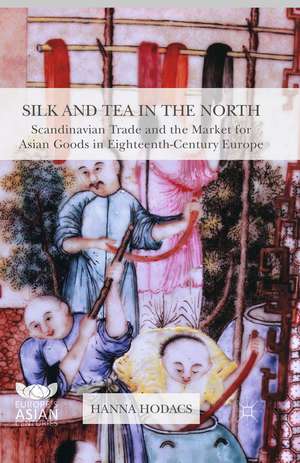Silk and Tea in the North: Scandinavian Trade and the Market for Asian Goods in Eighteenth-Century Europe: Europe's Asian Centuries
Autor Hanna Hodacsen Limba Engleză Paperback – 13 apr 2016
Preț: 411.16 lei
Nou
Puncte Express: 617
Preț estimativ în valută:
78.69€ • 81.74$ • 65.36£
78.69€ • 81.74$ • 65.36£
Carte disponibilă
Livrare economică 13-27 ianuarie 25
Preluare comenzi: 021 569.72.76
Specificații
ISBN-13: 9781349687336
ISBN-10: 1349687332
Pagini: 228
Ilustrații: XII, 216 p.
Dimensiuni: 140 x 216 mm
Greutate: 0.38 kg
Ediția:1st ed. 2016
Editura: Palgrave Macmillan UK
Colecția Palgrave Macmillan
Seria Europe's Asian Centuries
Locul publicării:London, United Kingdom
ISBN-10: 1349687332
Pagini: 228
Ilustrații: XII, 216 p.
Dimensiuni: 140 x 216 mm
Greutate: 0.38 kg
Ediția:1st ed. 2016
Editura: Palgrave Macmillan UK
Colecția Palgrave Macmillan
Seria Europe's Asian Centuries
Locul publicării:London, United Kingdom
Cuprins
Introduction: Global, European and Scandinavian histories and the East India trade. - 1. The Scandinavian trade with China. - 2. Dusty, ready-blended tea from the North. - 3. A colourful cargo for a motley people. - 4. Transferring and substituting tea and colours. - 5. Conclusion – New chronologies and geographies
Recenzii
“Hodacs’ Silk and Tea in the North … is a high commendable and well-executed history of the Scandinavian trade with China. … students and readers interested in the history of northern Europe’s engagement with Asia in general and with China in particular will find this volume of interest. And she is to be thanked for advancing our knowledge of European consumers and consumption of tea and silks in northern Europe over the eighteenth century.” (George Bryan Souza, The International Journal of Maritime History, Vol. 29 (3), August, 2017)
“Hodacs’s study is fine piece of historical scholarship, which draws upon insights from material history, economic history, and to a lesser extent the history of science. … Several illustrations and tables help readers find their way through the sometimes very dense but well-informed text, which sketches a rich canvas of European-Asian trade. By arguing for an integration of Scandinavia in histories of silk, tea, and other commodities,the study fills an important gap in historiography.” (Andreas Weber, Journal of World History, Vol. 28 (1), March, 2017)
“This volume adds both substance and nuance to our understanding of global trade and the evolving material systems that emerged within Europe.” (Beverly Lernire, Scandia, Vol. 83 (2), 2017)
“This volume adds both substance and nuance to our understanding of global trade and the evolving material systems that emerged within Europe.” (Beverly Lernire, Scandia, Vol. 83 (2), 2017)
Notă biografică
Hanna Hodacs is currently based at the Center for the History of Science, Royal Swedish Academy of Sciences, in Stockholm, Sweden; her work is concerned with Swedish naturalists in late 18th century London. She has previously worked at Warwick University, UK, Birmingham University, UK, and Uppsala University, Sweden.
Textul de pe ultima copertă
This book links the trade of the Danish and Swedish East India companies to the British taste for tea, a Scandinavian craving for colourful Chinese silk textiles, import substitutions schemes and natural history in the eighteenth century. It is a global history exploring the exchange of silver for goods in Canton. It is also a European history studying the wholesale market for Asian goods in Gothenburg and Copenhagen, the formation of taste and the impact of fashion in the blending of tea and the assortments of colours on wrought silk destined for markets across Europe. Linking material history to political economy and the histories of science, this book ends on the threshold of the nineteenth century, the rise of the second British Empire in Asia, and the creation of synthetic dyes in Europe.




